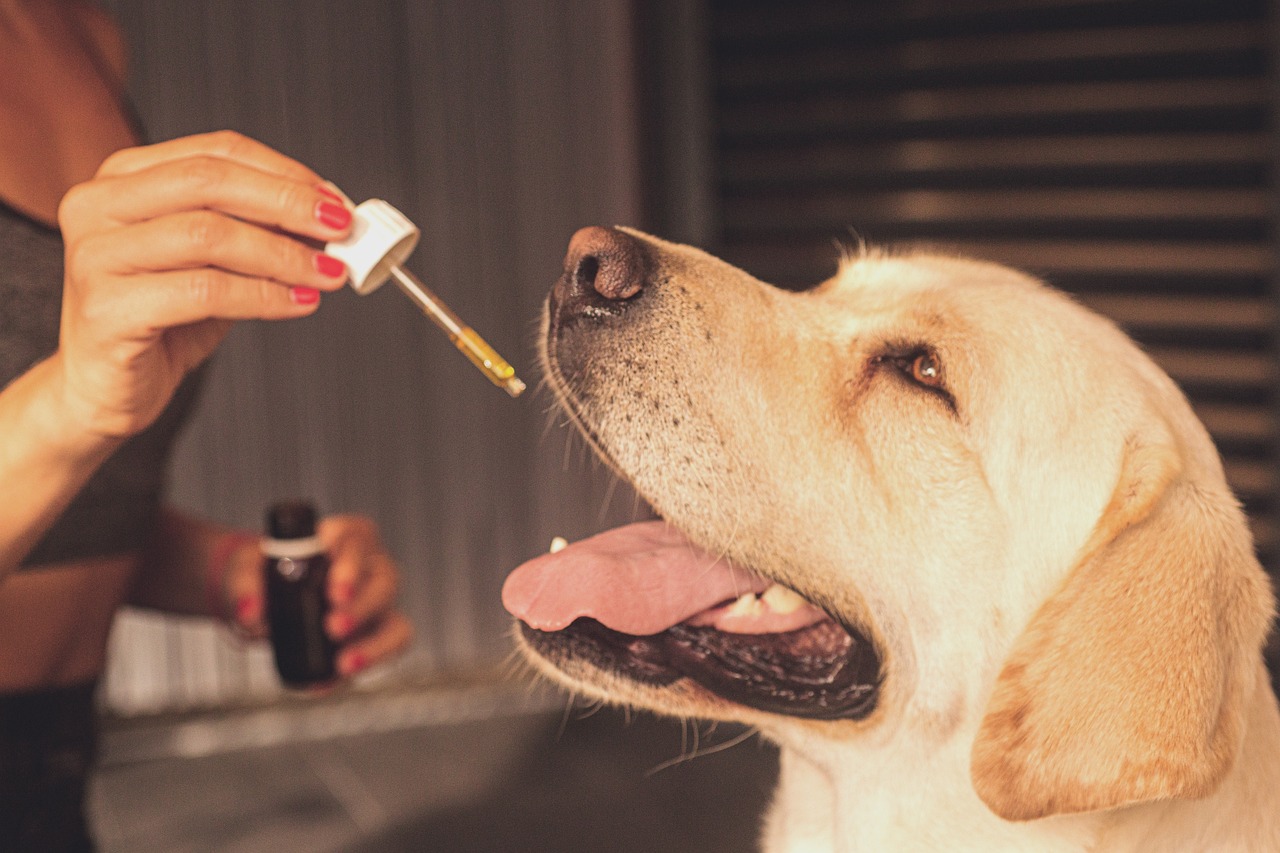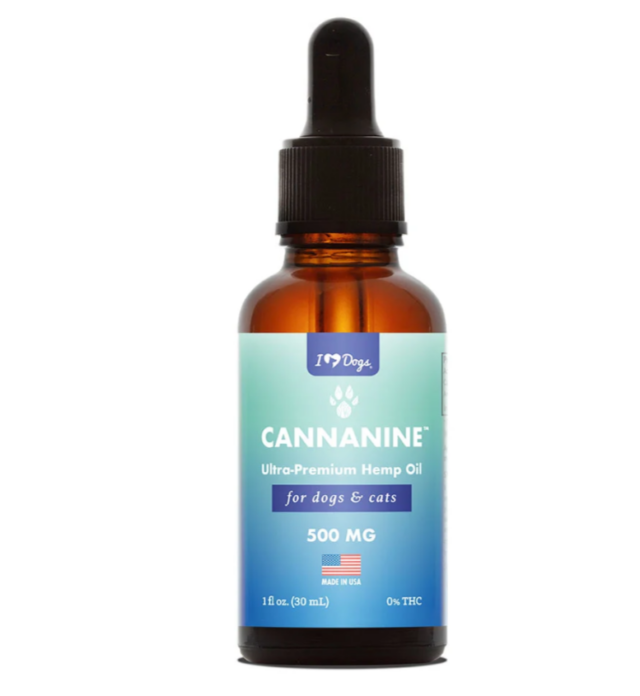With the growing awareness of the potential benefits of CBD (Cannabidiol) for pets, many dog owners are turning to this natural compound to address various health conditions and behavioral issues. This article will focus on determining the appropriate dosage of CBD for a 45 lb. dog, given the standard calculation of 0.2 mg of CBD per pound of your pet’s body weight.
 The Increasing Popularity of CBD for Canine Health
The Increasing Popularity of CBD for Canine Health
CBD, derived from the hemp plant, is a non-psychoactive compound that has shown promise in addressing issues such as anxiety, pain, and inflammation in pets. Because it lacks the THC component that leads to “high” sensations, it is considered safe for dogs when properly administered.
The Ideal Dosage of CBD For A 45 lb. Dog
The recommended dosage of CBD for a 45 lb. dog, based on a rate of 0.2 mg per pound, is 9.0 mg.
Note: It’s advisable to start with a smaller dosage and closely observe your dog’s reaction. If you don’t notice any significant changes, you may consider increasing the dosage by 20-30%.
Varieties of CBD Products
Several types of CBD products are available for dogs:
- CBD Oil: Highly concentrated and allows for accurate dosage.
- CBD Treats: A tasty and convenient way to administer CBD, although less precise.
- CBD Capsules: Ideal for dogs who are picky eaters but need precise dosing.
Factors that Influence CBD Dosage
Several factors can affect how CBD will impact your dog:
- Age: Younger dogs may process CBD differently than older dogs.
- Health Conditions: The severity of the condition being treated can affect the required dose.
- Other Medications: Be cautious of potential interactions with other medications your dog may be taking.
Methods to Administer CBD
There are various ways to give CBD to your dog:
- Direct Oral Administration: Provides the most immediate effects.
- Mixed with Food or Treats: A convenient but slower method.
- Topical Applications: Best for localized issues like skin conditions.
Monitoring and Adjusting the Dose
Keep an eye on your dog’s behavior and symptoms after administering CBD. This observation can help you decide whether the current dosage is effective or if an adjustment is needed.
Why Veterinary Guidance is Essential
Your dog’s health and safety are of the utmost importance. Before starting any CBD regimen, consult with a qualified veterinarian. This is especially vital if your dog is already on prescription medications or has existing health issues. Your vet can offer advice tailored to your dog’s unique needs and can also help in monitoring the effects and making any necessary dosage adjustments.
The Top Rated CBD Oil Recommended by iHeartDogs
iHeartDogs recently reviewed the best CBD oils for dogs and the best CBD treats for dogs. Our top-rated oil is the Cannanine brand, which we love for it’s Clean Label Project approval and 3rd Party Testing for every batch. In addition, each and every bottle sold provides 7 meals for homeless pets!
Conclusion
While CBD offers a plethora of potential benefits for dogs, it’s crucial to administer the correct dosage for effective and safe results. The suggested dosage for a 45 lb. dog, following the 0.2 mg per pound guideline, is 9.0 mg. Remember, it’s often best to start with a smaller dose and observe your pet’s reaction. Gradually increase by 20-30% if needed.
Always consult your veterinarian for a tailored treatment plan, especially if your dog is on other medications or has existing health conditions. Your vet’s advice can be invaluable in ensuring that CBD provides the maximum benefit for your furry friend.
Additional CBD for Dogs Resources
- Complete Guide to CBD & Hemp Oils for Dogs
- Best Rated CBD Oils for Dogs
- Best Rated CBD Treats for Dogs
- Best CBD Gummies for Dogs
- How Much CBD Should I Give a 5 lb. Dog?
- How Much CBD Should I Give a 6 lb. Dog?
- How Much CBD Should I Give a 7 lb. Dog?
- How Much CBD Should I Give a 8 lb. Dog?
- How Much CBD Should I Give a 9 lb. Dog?
- How Much CBD Should I Give a 10 lb. Dog?
- How Much CBD Should I Give a 11 lb. Dog?
- How Much CBD Should I Give a 12 lb. Dog?
- How Much CBD Should I Give a 13 lb. Dog?
- How Much CBD Should I Give a 14 lb. Dog?
- How Much CBD Should I Give a 15 lb. Dog?
- How Much CBD Should I Give a 20 lb. Dog?
- How Much CBD Should I Give a 25 lb. Dog?
- How Much CBD Should I Give a 30 lb. Dog?
- How Much CBD Should I Give a 35 lb. Dog?
- How Much CBD Should I Give a 40 lb. Dog?
- How Much CBD Should I Give a 45 lb. Dog?
- How Much CBD Should I Give a 50 lb. Dog?
- How Much CBD Should I Give a 55 lb. Dog?
- How Much CBD Should I Give a 60 lb. Dog?
- How Much CBD Should I Give a 65 lb. Dog?
- How Much CBD Should I Give a 70 lb. Dog?
- How Much CBD Should I Give a 75 lb. Dog?
- How Much CBD Should I Give an 80 lb. Dog?
- How Much CBD Should I Give a 85 lb. Dog?
- How Much CBD Should I Give a 90 lb. Dog?
- How Much CBD Should I Give a 95 lb. Dog?
- How Much CBD Should I Give a 100 lb. Dog?
- How Much CBD Should I Give a 110 lb. Dog?
- How Much CBD Should I Give a 120 lb. Dog?
- How Much CBD Should I Give a 130 lb. Dog?
- How Much CBD Should I Give a 140 lb. Dog?
- How Much CBD Should I Give a 150 lb. Dog?
- How Much CBD Should I Give a 160 lb. Dog?
- How Much CBD Should I Give a 170 lb. Dog?
- How Much CBD Should I Give a 180 lb. Dog?
- How Much CBD Should I Give a 190 lb. Dog?
- How Much CBD Should I Give a 200 lb. Dog?

 Toledo, United States.
Toledo, United States.